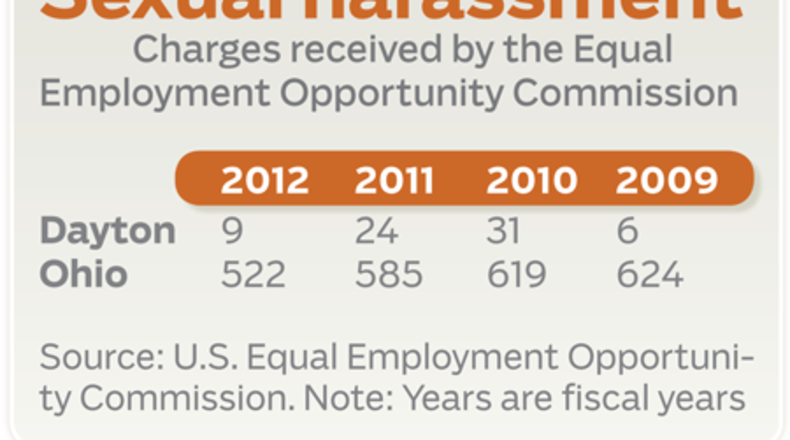It was the fewest charges originating out of the state since 1997, and the number of allegations has decreased by about 50 percent in the last decade and a half.
But the recent declines are likely a result of harassment victims being reluctant to report the activity and file charges out of fear of losing their jobs, according to some local attorneys. The struggling economy may mean workers are less inclined to put their jobs at risk in the hopes of stopping unwanted treatment.
“Those numbers are discouraging, because I don’t think it’s because of less harassment,” said Craig T. Matthews, principal of Craig T. Matthews & Associates, a law firm in Centerville. “I tend to think it’s probably more women feeling discouraged.”
Last year, charges of sexual harassment in the workplace originating out of Ohio fell for the fourth consecutive year and allegations dropped to the lowest level in at least 15 years, the commission said. The commission received 585 charges from Ohio in 2011 and 619 in 2009. In 1997, the commission received 1,100 from the Buckeye State.
Last year, the commission determined about 54 percent of charges had no reasonable cause, 18 percent of charges were settled and 36 percent had merit resolutions. About 84 percent of charges in Ohio were filed by women.
The workplace has changed for the better in recent years, because most employers now have policies forbidding sexual discrimination and harassment, and there is more awareness of the issue and less tolerance of such activity, said Dalma Grandjean, attorney with Altick & Corwin Co.
“The climate has changed in part because there was a lot of litigation and complaints filed,” she said.
But Grandjean said the recent decrease in sexual harassment charges could be linked to the downturn in the economy. She said the bad economy makes people scared of losing their jobs, and she has met with workers who decided not to file harassment claims because they were worried they would be terminated.
Fear of retaliation from employers is a major hurdle to addressing sexual harassment in a tough economy, said Lisa Maatz, director of public policy and government relations with the American Association of University Women, an organization that advocates for women based in Washington, D.C.
She said many women became the primary breadwinners of their families during the downturn because their spouses were laid off. She said victims of harassment often choose to endure the treatment for financial reasons until they can find other jobs or get transferred.
“An instinct among women is saying, ‘I’m going to deal with this, I am going to put my head down, I am going to work because I have a family support and I am just going to ignore them,’” Maatz said.
But victims of harassment should document the interactions by keeping a journal of conversations and encounters and saving e-mails and becoming familiar with their employer’s work rules and policies, Maatz said. Finding witnesses to corroborate the harassment is extremely helpful when possible.
As soon as harassment occurs, victims should immediately and unequivocally let their harasser know the behavior is unacceptable, said Matthews, the Centerville attorney.
“The women tend to let the harassment go on for way too long and don’t create a good record of it,” he said.
A few years ago, Matthews represented a female clerk at a plant in Troy who claimed she was repeatedly harassed by co-workers and supervisors who made vulgar and offensive comments about her body. She said managers were aware of the harassment but failed to address the problem. She eventually quit and then sued the company. The case went into mediation and it was settled, he said.
But the decline could also indicate that employers are less willing to tolerate sexual harassment, said Deborah Adams, an attorney with Frost Brown Todd LLC in Cincinnati who has represented businesses facing harassment claims.
“I am always proud of our clients who are vigilant about enforcing standards of good workplace conduct with their training and preventative measures,” she said. “Maybe there is more of an economic reason to devote time to that, because you cannot afford the time or the money associated with nonsense in the workplace.”
About the Author

